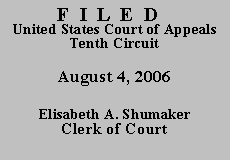

ROY LAMONTE BOWMAN,
Plaintiff-Appellant,
v.
SAM CALBONE, Warden; RON
WARD; and ATTORNEY GENERAL
OF THE STATE OF OKLAHOMA,
Respondents-Appellees.
Before KELLY, McKAY, and LUCERO, Circuit Judges.
Appellant is a state prisoner, seeking habeas relief and challenging the
execution of his sentence under 28 U.S.C. § 2241. He claims that he was denied
due process in connection with a 1996 disciplinary proceeding. Appellant had
been placed in a pre-parole conditional supervision program in 1991, and after
his arrest and misconduct conviction in 1996, he was not returned to the program.
In 2000, Appellant executed a state petition for a writ of habeas corpus. He was
unsuccessful in state district court, and the Oklahoma Court of Criminal Appeals
denied him relief in 2001. Appellant initiated the present action on August 12,
2005. A magistrate judge recommended that his petition be denied as untimely.
Report and Recommendation, 7 (W.D. Okla. Aug. 31, 2005). The district court
adopted the magistrate judge's report in full and dismissed Appellant's petition
as untimely. Order, 3 (W.D. Okla. Jan. 8, 2006). The district court also denied
Appellant a certificate of appealability in an order on February 21, 2006.
A one-year limitations period applies in state prisoners' habeas actions. 28 U.S.C. § 2241(d)(1)(A)-(D) (2000). In addition, federal law provides that the limitations period is tolled for a "properly filed application for State post-conviction or other collateral review." 28 U.S.C. § 2241(d)(2) (2000). As the magistrate judge properly recommended, Appellant's limitations period on all habeas claims would have begun by May 21, 2001 (date of state court filing), and ended on May 21, 2002. Report and Recommendation, at 6. Therefore, his filing of a habeas petition in 2005 is untimely. We are also in accord with the district court's finding that Appellant did not satisfy the requirements for equitable tolling. Order, at 2.
Appellant now seeks from this court a certificate of appealability. The issues he raises on appeal are identical to those brought before the district court.
To grant a certificate of appealability, Appellant must make a "substantial showing of the denial of a constitutional right." 28 U.S.C. § 2253(c)(2) (1994). To meet this burden, Appellant must demonstrate "that reasonable jurists could debate whether (or, for that matter, agree that) the petition should have been resolved in a different manner or that the issues presented were adequate to deserve encouragement to proceed further." Slack v. McDaniel, 529 U.S. 473, 484 (2000) (quotation omitted).
We have carefully reviewed Appellant's brief, the magistrate judge's recommendations, the district court's disposition, and the record on appeal. Nothing in the facts, the record on appeal, or Petitioner's filing raises an issue which meets our standard for the grant of a certificate of appealability. For substantially the same reasons set forth by the magistrate judge in the Report and Recommendation of August 31, 2005, and the district court's orders of January 8, 2006, and February 21, 2006, we cannot say "that reasonable jurists could debate whether (or, for that matter, agree that) the petition should have been resolved in a different manner." Id.
Accordingly, we DENY Petitioner's request for a certificate of appealability and DISMISS the appeal.
Entered for the Court
Monroe G. McKay
Circuit Judge